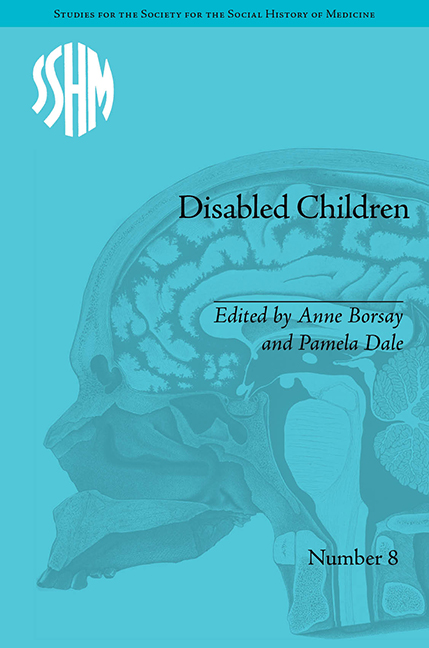Book contents
- Frontmatter
- Contents
- Acknowledgements
- Notes on Contributors
- Introduction: Disabled Children – Contested Caring
- 1 Club Feet and Charity: Children at the House of Charity, Soho, 1848–1914
- 2 Insanity, Family and Community in Late-Victorian Britain
- 3 The Mixed Economy of Welfare and the Care of Sick and Disabled Children in the South Wales Coalfield, c. 1850–1950
- 4 The Question of Oralism and the Experiences of Deaf Children, 1880–1914
- 5 Exploring Patient Experience in an Australian Institution for Children with Learning Disabilities, 1887–1933
- 6 From Representation to Experience: Disability in the British Advice Literature for Parents, 1890–1980
- 7 Treating Children with Non-Pulmonary Tuberculosis in Sweden: Apelviken, c. 1900–30
- 8 Health Visiting and Disability Issues in England before 1948
- 9 Spanish Health Services and Polio Epidemics in the Twentieth Century: The ‘Discovery’ of a New Group of Disabled People, 1920–70
- 10 Cured by Kindness? Child Guidance Services during the Second World War
- 11 Education, Training and Social Competence: Special Education in Glasgow since 1945
- 12 Hyperactivity and American History, 1957–Present: Challenges to and Opportunities for Understanding
- Notes
- Index
11 - Education, Training and Social Competence: Special Education in Glasgow since 1945
- Frontmatter
- Contents
- Acknowledgements
- Notes on Contributors
- Introduction: Disabled Children – Contested Caring
- 1 Club Feet and Charity: Children at the House of Charity, Soho, 1848–1914
- 2 Insanity, Family and Community in Late-Victorian Britain
- 3 The Mixed Economy of Welfare and the Care of Sick and Disabled Children in the South Wales Coalfield, c. 1850–1950
- 4 The Question of Oralism and the Experiences of Deaf Children, 1880–1914
- 5 Exploring Patient Experience in an Australian Institution for Children with Learning Disabilities, 1887–1933
- 6 From Representation to Experience: Disability in the British Advice Literature for Parents, 1890–1980
- 7 Treating Children with Non-Pulmonary Tuberculosis in Sweden: Apelviken, c. 1900–30
- 8 Health Visiting and Disability Issues in England before 1948
- 9 Spanish Health Services and Polio Epidemics in the Twentieth Century: The ‘Discovery’ of a New Group of Disabled People, 1920–70
- 10 Cured by Kindness? Child Guidance Services during the Second World War
- 11 Education, Training and Social Competence: Special Education in Glasgow since 1945
- 12 Hyperactivity and American History, 1957–Present: Challenges to and Opportunities for Understanding
- Notes
- Index
Summary
Introduction
In the period from 1945 to the early 1970s, special education in Glasgow expanded as part of general developments in education born out of a post-war concern for the health of the nation. The Education (Scotland) Act of 1945 made it the duty of education authorities to ascertain which children might require ‘special educational treatment’ and to provide this. However, the ascertainment of handicap was, until the Education (Mentally Handicapped) (Scotland) Act of 1974, also used to discover those with ‘severe’ learning disabilities who were excluded from educational provision because of their perceived lack of ‘educability’. The publication of the Warnock Report in 1978 heralded a new era of special educational policy in the whole of the UK. Its publication and the passing of subsequent education acts sought to promote integration and inclusion. Furthermore they stressed the need for structuring understanding of handicap around the idea of a continuum of needs and the movement away from designated categories of impairment.
This history has received relatively little attention, although lately developments in special education have been scrutinized at the national level. Recent studies of community care have also directed attention away from traditional institutional histories of disability. Such research suggests renewed interest in exploring the experiences of disabled children outside of hospitals. French's study of education for visually impaired people also helps provide new perspectives on education for those outside the mainstream.
- Type
- Chapter
- Information
- Disabled ChildrenContested Caring, 1850–1979, pp. 159 - 172Publisher: Pickering & ChattoFirst published in: 2014

